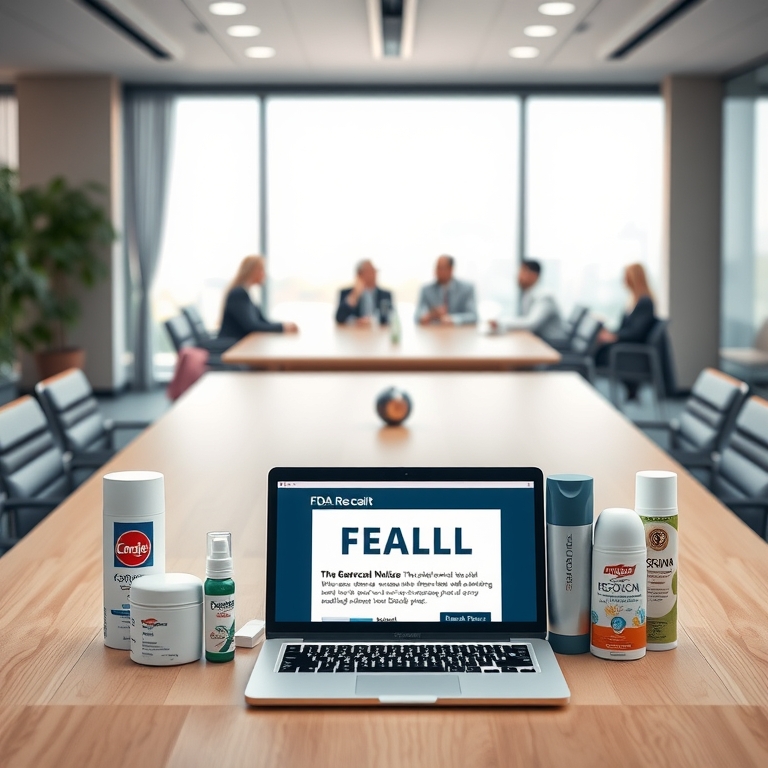In an unexpected move that has sent ripples across the personal care industry, the U.S. Food and Drug Administration (FDA) has announced a recall of several deodorant brands due to the presence of potentially hazardous chemicals. This decision, which underscores the agency’s commitment to consumer safety, has raised significant concerns among consumers and manufacturers alike, highlighting the critical importance of stringent quality control measures in the production of personal care products.
The recall was prompted by findings that certain deodorants contained high levels of benzene, a chemical known to pose serious health risks. Benzene is a volatile organic compound that, according to the Centers for Disease Control and Prevention (CDC), can cause harmful effects on bone marrow and has been linked to cancer. The presence of such a substance in products designed for daily use has understandably alarmed both consumers and health professionals, leading to heightened scrutiny of manufacturing processes within the industry.
The FDA’s decision follows a comprehensive investigation that included random testing of various deodorant products available on the market. The testing revealed that certain batches of these products contained benzene levels exceeding the acceptable limits set by the agency. The manufacturers involved have been quick to respond, cooperating fully with the FDA and initiating their own internal reviews to determine the source of contamination and prevent future occurrences.
For many consumers, deodorant is an essential part of their daily hygiene routine. The idea that a product meant to enhance personal comfort and confidence could potentially pose a health risk is unsettling. This recall has sparked a broader conversation about the safety of personal care products and the regulatory mechanisms in place to protect consumers. While the FDA has rigorous guidelines for the approval and monitoring of such products, incidents like this underscore the need for continual vigilance and adaptation to emerging scientific knowledge.
The impact of the recall extends beyond consumer confidence, affecting the financial and reputational standing of the brands involved. For these companies, the immediate priority is damage control. This involves not only removing the affected products from shelves but also addressing consumer concerns through transparent communication. Many of the brands have issued public statements, emphasizing their commitment to safety and outlining the steps they are taking to rectify the situation. Some have offered refunds or exchanges to affected customers, aiming to rebuild trust and demonstrate accountability.
The recall also brings to light the complexities of the supply chain in the personal care industry. The presence of benzene in deodorants could be traced back to raw materials, packaging, or even contamination during manufacturing. This highlights the critical importance of thorough testing and quality assurance at every stage of production. Manufacturers may need to reassess their supply chains and implement more stringent testing protocols to ensure that all components meet safety standards.
For industry analysts, this incident serves as a stark reminder of the potential vulnerabilities in product safety assurance. It is a call to action for manufacturers to invest in more advanced technologies and practices that can detect and eliminate contaminants before products reach consumers. This may involve adopting new testing methodologies, enhancing traceability of ingredients, and fostering closer collaborations with suppliers to ensure compliance with safety standards.
The regulatory landscape, too, may see changes in response to this recall. The FDA might consider revising its guidelines to incorporate stricter testing requirements or more frequent inspections. Such measures would aim to prevent similar incidents in the future and reinforce consumer confidence in the safety of personal care products. Additionally, there may be increased emphasis on transparency, with companies potentially required to disclose more detailed information about their testing processes and results.
In the wake of this recall, consumer advocacy groups are likely to intensify their efforts to promote awareness about product safety. These organizations play a crucial role in educating the public about potential risks and advocating for stronger regulatory frameworks. Their work ensures that consumer voices are heard and that companies are held accountable for maintaining high safety standards.
Despite the challenges posed by the recall, it also presents an opportunity for the personal care industry to innovate and improve. By prioritizing safety and transparency, companies can not only address immediate concerns but also enhance their long-term reputation and competitiveness. This incident could serve as a catalyst for positive change, driving the industry toward more sustainable and consumer-centric practices.
In conclusion, the FDA’s recall of deodorant brands over potential health risk chemicals is a significant development that underscores the importance of safety in personal care products. It highlights the need for rigorous quality control, transparent communication, and regulatory vigilance. As the industry navigates this challenge, the focus will be on restoring consumer trust and ensuring that such incidents are prevented in the future. Through innovation and collaboration, the personal care sector can emerge stronger, reaffirming its commitment to the health and well-being of consumers.

Leave a Reply